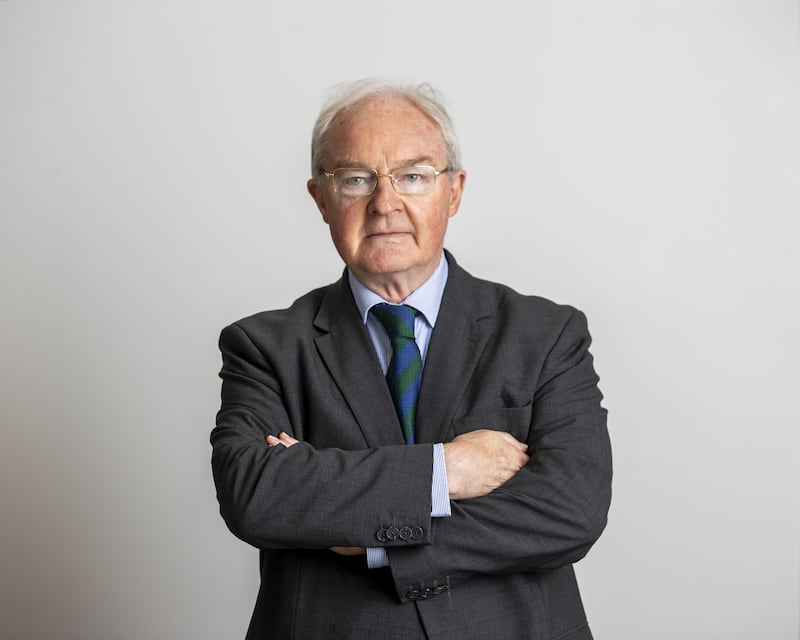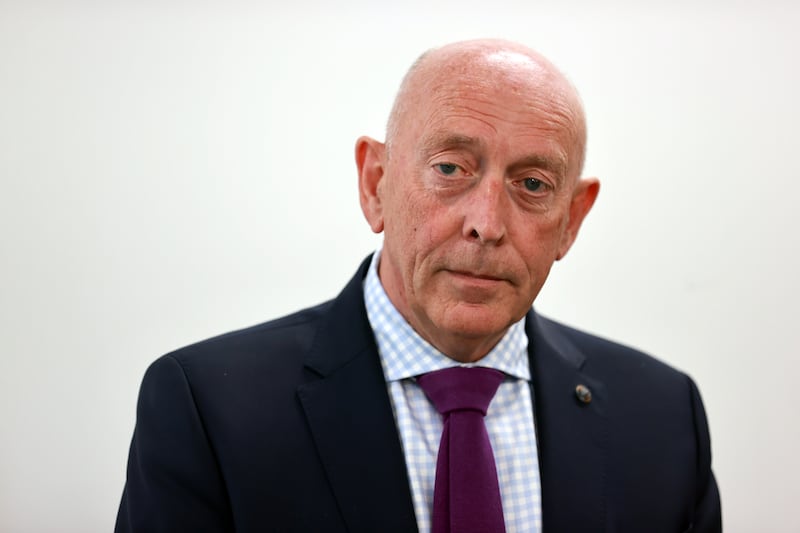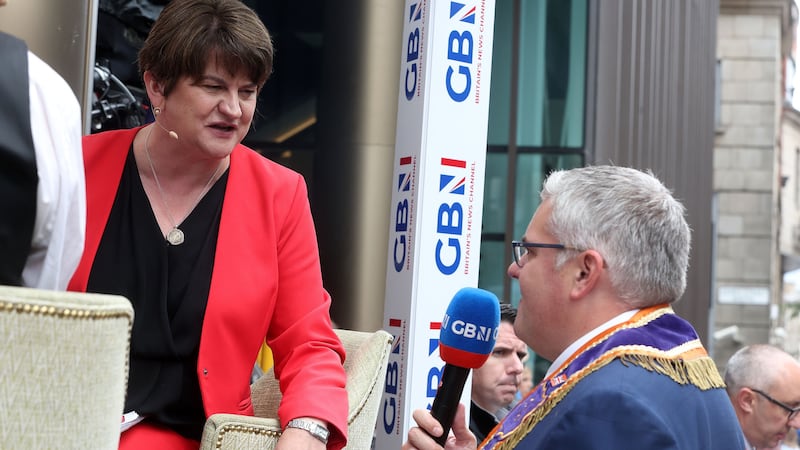The head of a human rights body set up under the Good Friday Agreement has made unprecedented criticisms of the British government’s legacy body.
Alyson Kilpatrick, Chief Commissioner at the Northern Ireland Human Rights Commission, has castigated the role and governance of the Commission for Reconciliation and Information Recovery (ICRIR).
The organisation Ms Kilpatrick leads was set up as part of the Good Friday Agreement to ensure that the north’s institutions comply with human rights.
In an interview with the Irish News, Ms Kilpatrick sets out her concerns.
- She maintains that the ICRIR lead investigator cannot be independent given his former role as a senior police officer and concludes that his position is “untenable.”
- She questions the possible conflicts of interests of the chief commissioner of the ICRIR who also serves as a supplementary panel member of the Supreme Court.
- She has concerns about ICRIR’s “governance arrangements” along with “the control that the Secretary of State for Northern Ireland has over the whole commission”.
Last month, The Irish News revealed that up to 26 former RUC officers, staff and British soldiers are currently working for the ICRIR.
It was established under the Conservative Party’s Northern Ireland Troubles (Legacy and Reconciliation) Act 2023, which ended all inquests and civil cases, along with introducing conditional immunity.
The chief commissioner of the ICRIR is former Lord Chief Justice Sir Declan Morgan, while former PSNI assistant chief constable, Peter Sheridan is Commissioner for Investigations.
A former RUC member, Mr Sheridan headed the Crime Operations Department, which included the C3 intelligence unit, often referred to Special Branch.
He retired in 2008 after 32 years in the police and was later appointed as chief executive of Co-Operation Ireland – an all-Ireland peace building organisation.
Ms Kilpatrick has primary concerns about the commission centre on its structure and “governance arrangements” along with “the control that the Secretary of State for Northern Ireland has over the whole commission”.
Secretary of State Hilary Benn last year said he intends to introduce a remedial order, which amends exiting legislation, to remove all provision relating to immunity and that future civil proceedings will be allowed to proceed.
The Labour MP said he also intends to introduce primary legislation to restore inquests, beginning with those halted by the legacy act.
The promised reforms have yet to be made.
Although the British government says it has plans to repeal and replace the contested act, it intends to retain the ICRIR.
The legacy body has faced legal challenges from relatives of people killed during the Troubles, including the widow of Seamus Dillon, who was shot dead by loyalists in 1997.
Last year The Court of Appeal found that a British government veto over sensitive material that can be disclosed by the commission is not compatible with human rights laws.
The court also ruled that the ICRIR does not provide victims and their next of kin adequate means to participate in its processes.
Many people impacted by the Troubles are opposed to the legacy body, believing it was designed to protect state participants.
Mr Benn is appealing against parts of the judgment to the Supreme Court.
 Sir Declan Morgan (Liam McBurney/PA)
Sir Declan Morgan (Liam McBurney/PA)
A former Lord Chief Justice, Mr Morgan is currently a Judicial Commissioner at the Investigatory Powers Commission and a Supplementary Panel member of the UK Supreme Court.
Ms Kilpatrick, whose organisation is an intervenor in the pending Supreme Court proceedings, said dealing with potential conflicts of interest can be complex.
“The way conflict of interest works is that it’s for the person who may have the conflict and in this case, the president of the Supreme Court to decide,” she said.
She added that potential conflicts can be difficult to handle for members of the legal profession.
“That is a very difficult and uncomfortable position to be in, and I would say the vast majority of lawyers would not feel comfortable making that sort of submission to a judge – that they had a conflict of interest,” she said.
“Which is why judges are not supposed to have any other jobs when they are sitting on the bench.”
Ms Kilpatrick suggested some lawyers are reluctant to highlight potential conflicts of interest.
“I know some members of the legal profession would be less comfortable arguing against the ICRIR knowing that someday they may come in front of the Supreme Court panel that may include a person whom they have maligned,” she said.
While Mr Morgan might not be appointed to hear any cases linked to the ICRIR, wider issues relating to confidence arise, according to Ms Kilpatrick.
“And it’s not just about hearing the case, being a decision maker on the cases, it’s about being part of that network that is seen to be the final arbiter of a case,” she said.
“It’s not my decision, and I don’t know enough about the rules of the Supreme Court to know whether, as in the appointment processes, I couldn’t suggest that he has necessarily done anything wrong.
“But your question, ‘is there a difficulty with it’, and I think yes.”
 Peter Sheridan (Liam McBurney/PA)
Peter Sheridan (Liam McBurney/PA)
During proceedings linked to the Dillon case last year lawyers for the commission made reference to the “practical independence” of Mr Sheridan.
“It was put in our written submissions and our counsel on his feet did refer to the fact that the chief investigator was a former, very senior, police officer, who at the very least would have trained alongside, trained, investigated, mentored or been mentored by people who may now be implicated in some of these investigations,” Ms Kilpatrick said.
Ms Kilpatrick believes it is impossible for Mr Sheridan to remove himself from all investigations where there is potential conflict.
“But, when the chief investigator was responsible for the whole force, he was that senior, it’s impossible for him to recuse himself from every investigation, every single investigation may involve somebody, either himself, somebody he knows very well, somebody he worked with etc,” she said.
“So, it’s an impossible task to recuse himself from it and you would have to recuse himself from the whole structure, is what we would say.”
Alyson Kilpatrick
PICTURE COLM LENAGHAN
Ms Kilpatrick said that authorities have human rights obligations.
“Nothing personal, absolutely nothing personal, very distinguished man, very distinguished career, and I am sure knows many a question to ask, but that’s not the point,” she said.
“The point about this is the state has a human rights obligation.”
Ms Kilpatrick said society as a whole expects legacy cases to be “investigated effectively and independently” adding that “means independent of those implicated”.
“And unfortunately, in Northern Ireland, we know that some of the people who are implicated are former police officers, former army or security service,” she said.
“We know this, it’s not in dispute.
“So, that being the case, having senior leadership coming from all those branches just seems to be unacceptable, in my view, not my personal view, in human rights terms.”
Ms Kilpatrick believes the majority of relatives view Mr Sheridan’s role as untenable.
“If you ask the families, I suspect most of them will tell you ‘no’, his position is simply untenable and the fact that he took the position, the fact that he said he consulted with paramilitaries before taking it, all of that is on the record, the fact that he was a very senior, central officer during some of this period of time would make it untenable,” she said.
“And that in itself is very, very persuasive because if they say it’s about reconciliation and about families and getting truth, then surely the first people you try and convince are the families.
“If they say it’s not tenable then why persist any longer, what’s the point?”
Significantly, the human rights expert does not believe Mr Sheridan’s position is tenable in the context of Article Two of the European Convention on Human Rights, which protects the right to life.
“My job is more as an advisor and assessor of the human rights compliance, I don’t think it’s tenable in Article Two compliance terms,” she said.
“Because, there has to be hierarchical independence, there has to be institutional independence and there has to be practical independence.
“And if you look at some of the human rights cases, situations were far fewer investigators of a much lower rank were involved in investigations and the court said that wasn’t sufficiently independent.
“So, in my view any objective person applying the human rights cases as they stand at the minute would say it’s not tenable in terms of practical independence.”
Ms Kilpatrick added this view “is only strengthening the more we hear about how its staffed”.
“As far as I can tell there’s a very high number of people, even if not RUC, army or security service, involved in the policing family in Northern Ireland,” she said.
“So, a lot of the others have been taken from Kenova, not former RUC or PSNI, but police.
“Also the Police Ombudsman’s Office also engaged in some of these investigations.
“Everyone has some interest, it not necessarily a bad motive, but an interest in proving points if nothing else.”
Ms Kilpatrick contends that both Mr Sheridan and Mr Morgan have failed to demonstrate independence.
“The other point I would make about the occupation of those two senior roles is since the set up of ICRIR there have been many opportunities to engage with the families more directly, to share information, to be transparent, demonstrate the independence and in my view, they have failed to do that since being set up,” she said.
“And in fact, they have become maybe a little more combative than they needed to over those issues.
“And I think that’s a problem.”
“Article Two is not some dry, technical, legal thing, it’s about securing public confidence, it’s about making sure the state’s accountable for what it did, even during conflict situations.
“It’s about making sure that the people affected and wider society can go to bed at night knowing that the people who are telling them what happened are independent and have no interest in it, no personal interest whatsoever.”
She added that the majority of people recognise independence when they encounter it.
“No inference on those people, we know what independence is when we see it,” she said.
“And we know what independence isn’t.”
“If the legal independence isn’t there, families don’t accept it, then what is the purpose in continuing because it can’t be reconciliation?”.
An ICRIR spokesperson said: “The High Court and Appeal Court in Northern Ireland have clearly and unequivocally declared that the ICRIR is an appropriately independent public authority, both operationally, organisationally, and in relation to its governance and sponsorship arrangements. In particular, the Courts concluded: ‘The fact that the Commissioner for Investigations is a former RUC/PSNI officer does not mean he lacks the necessary independence to carry out investigations into legacy issues.’
“It is disappointing that the head of another UK Government arms-length body responsible for human rights does not appear to accept this settled UK caselaw, recently determined by the UK Supreme Court as ‘not an arguable point of law’, and it would be interesting to know whether the Chief Commissioner’s attacks on Sir Declan Morgan and Peter Sheridan reflect the respective opinions of all NIHRC Commissioners.
“The ICRIR renews its invitation for the NIHRC Chief Commissioner to meet with the ICRIR to hear the facts about our organisation, and to join us in building principles of equality, inclusion, rights, and reconciliation as we seek the unvarnished truth about the legacy of the Northern Ireland conflict.”
A spokesperson for the Supreme Court said Sir Declan “would not sit in any appeal which gave rise to a conflict of interest.
“The Supplementary Panel is a group of judges on whom the Court can call if and when additional judges are needed. They have no involvement in any case unless they are requested to sit as a member of the Court hearing that appeal.”
Ms Kilpatrick has previously worked as an independent human rights legal advisor to the Policing Board and in 2016 was appointed special legal advisor to the UK’s Independent Reviewer of Terrorism Legislation.
In the past she carried out a review of European Convention on Human Rights compliance on a number legacy investigations under Operation Kenova.
She currently sits on the Group of Experts and Stakeholders with the McCullough Review, which is investigating allegations that the PSNI spied on journalists, lawyers and others.
She took up her role as Chief Commissioner to the Northern Ireland Human Rights Commission in 2021.

